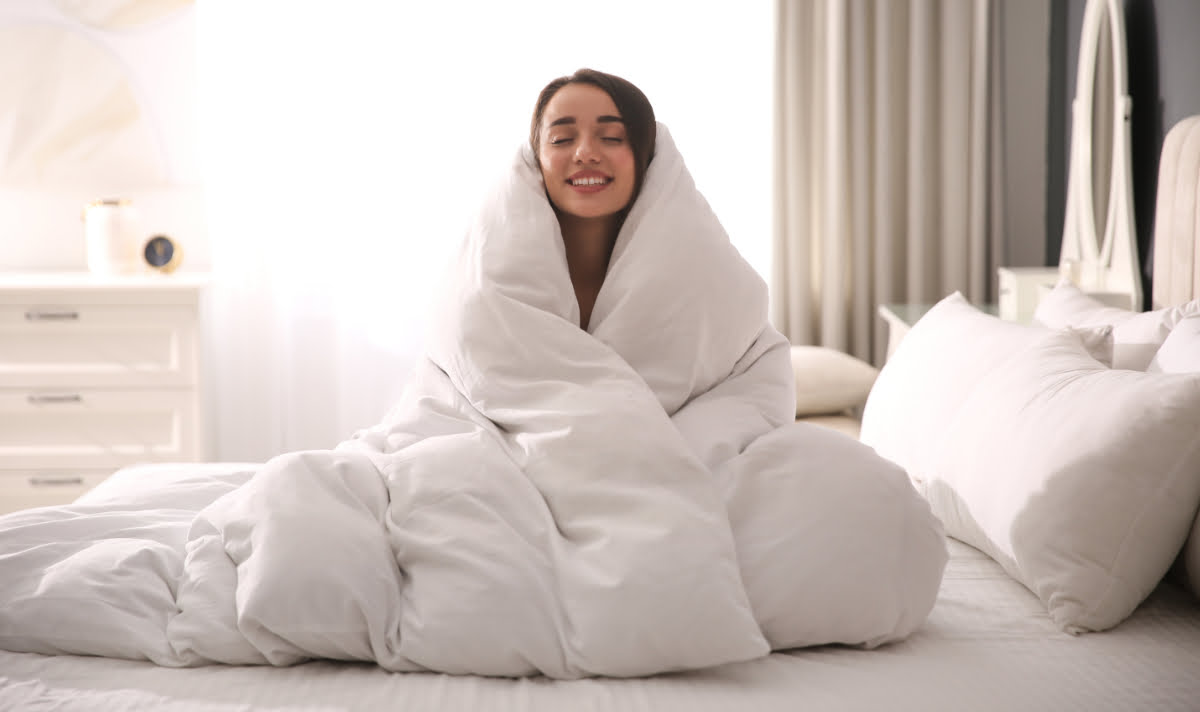When the clocks change in October, we have months of cold, dark evenings and mornings to look forward to – and people naturally want to spend more time in their beds. Less sunlight means your brain produces more of a hormone called melatonin, which makes you feel more sleepy.
Waking up in the morning is something very few people enjoy but for some, the feeling is much worse.
There are a number of reasons why we are more tired and need more sleep as we head into the colder, darker months. These include having less exposure to sunlight during the day. Low light decreases serotonin which regulates mood and can disrupt the circadian rhythm (otherwise known as our internal body clock) telling us when we need to be awake and when we need to sleep. Darker evenings also signal the body to produce melatonin (the sleep hormone) earlier so we feel tired and ready for bed.
We also find our lifestyle habits change too which can affect energy levels – we tend to exercise less, spend less time outdoors and are more tempted by comforting food.
Here’s some top advice on how to get out of bed on dark, cold mornings.
- No one likes to get out of a warm, comfy bed so make sure you set your heating to come on at a certain time so it’s warm when you get out of bed.
- Don’t be tempted to press the snooze button either! If you press the snooze button, your brain knows it’ll go off again. You won’t get any of the deep, resting slumber in between snoozes. Set your alarm for when you definitely have to get up. If you have a hard time not pressing the snooze button, try putting it across the room so you have to walk over there, waking you up along the way. Once your alarm has gone off, open your curtains to start letting daylight in or alternatively while it’s still very dark in the depths of winter, switch a bright light on. This will help to suppress your melatonin levels and start to make you feel more awake. Some people benefit from sunrise alarm clocks.
- Do some simple stretching exercises for 10 minutes to wake your body and ease it into the day.
- Consider light therapy where a special lamp called a light box is used to simulate exposure to sunlight. You sit in front of it for around 30 minutes a day and it can help reduce sleep inertia (morning grogginess) to make you wake feeling more refreshed.
- Take a shower to wake you up and energise you. If you can bear, a couple of minutes of cooler water at the end, do it. You can also splash your face with cold water which will help to wake you up and boost circulation.
- Drinking a cup of hot water and lemon is also an ideal way to start your day.
- Make sure your bed is fit for purpose. Now’s the time to take a closer look at your bed and see if it’s affecting your night-time rest and daytime energy levels. If you’re uncomfortable in bed, you won’t sleep as well and you may feel tired in the morning.
- If you find it harder to get out of bed in the early part of the week, you may be suffering from what’s called ‘social jet lag’. By sleeping in at the weekend, our body clocks re-set so when the alarm clock goes off early on a Monday morning, it leaves us too tired for the working week – and it can take up to mid-week before we feel any less groggy. Immediate effects of ‘social jet lag’ include poorer memory and reaction times – definitely not a good start to a working week!
Getting a good night’s sleep is not only good for your health and wellbeing but it helps you wake up in a morning. Continue to practice good ‘sleep hygiene’ such as keeping regular hours for bedtime and wake time, putting a wind down routine in place, looking at your bedroom environment and assessing your lifestyle habits (diet, exercise, work etc).
Remember, it’s quite normal to feel more tired over winter. However, if you feel quite lethargic it can be a sign of more serious winter depression, known medically as seasonal affective disorder (SAD). See your GP if you think this is you.






0 Comments